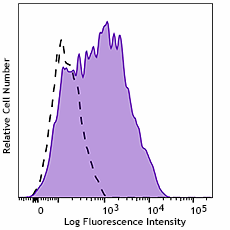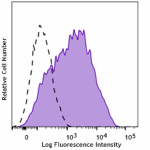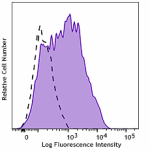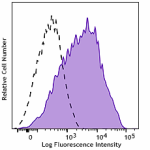- Clone
- A20050B (See other available formats)
- Regulatory Status
- RUO
- Other Names
- CD273, Programmed cell death 1 ligand 2 (PD-L2), B7 dendritic cell molecule (B7-DC), Butyrophilin B7-DC, PDCD1 Ligand 2
- Isotype
- Rat IgG2b, κ
- Ave. Rating
- Submit a Review
- Product Citations
- publications

-

Human monocyte-derived dendritic cells were stained with anti-human CD273 (clone A20050B) PE (filled histogram) or rat IgG2b, κ PE isotype control (open histogram).
| Cat # | Size | Price | Quantity Check Availability | Save | ||
|---|---|---|---|---|---|---|
| 947807 | 25 tests | 130 CHF | ||||
| 947808 | 100 tests | 245 CHF | ||||
PD-L2 is a type I transmembrane protein of 273 amino acids, and it is a member of the B7 family. Human PD-L2 has 70% amino acid identity to its mouse orthologue. PD-L2 is the second ligand for PD-1, and its binding to PD-1 leads to the inhibition of T cell receptor–mediated lymphocyte proliferation and cytokine secretion. PD-L2/PD-1 interaction suppresses immune responses against autoantigens and tumors and plays an important role in the maintenance of peripheral immune tolerance. Antibody blocking of PD-L2 on dendritic cells results in enhanced T cell proliferation and cytokine production. Interaction of PD-1 by PD-L1-Ig or PD-L2-Ig fusion protein has an inhibitory effect on proliferation and cytokine production during anti-CD3-mediated stimulation. PD-L2 is expressed in biopsies from human asthmatics and lungs of aeroallergen-treated mice and its expression correlates with the asthma severity. In vivo blockade of PD-L2 reduces the severity of allergen-driven airway hyperresponsiveness (AHR). Blockage of PD-L2 induces the IL-12 production by DC; IL-12 may limit the severity of allergen-induced AHR antagonizing IL-13. In addition, blockade of PD-1 does not have effect on AHR; therefore, PD-L2 controls asthma severity in a PD-1 independent manner. PD-L2 binds to a second receptor, RGMb (repulsive guidance molecule b) which is expressed in lung interstitial macrophages and alveolar epithelial cells and is a co-receptor for bone morphogenetic proteins BMP2/4. Blockade of the RGMb/PD-L2 interaction significantly impaired the development of respiratory tolerance since the initial T cell expansion is inhibited.
Product DetailsProduct Details
- Verified Reactivity
- Human
- Antibody Type
- Monoclonal
- Host Species
- Rat
- Immunogen
- Recombinant human PD-L2 (B7-DC, CD273)-Fc chimera
- Formulation
- Phosphate-buffered solution, pH 7.2, containing 0.09% sodium azide and BSA (origin USA)
- Preparation
- The antibody was purified by affinity chromatography and conjugated with PE under optimal conditions.
- Concentration
- Lot-specific (to obtain lot-specific concentration and expiration, please enter the lot number in our Certificate of Analysis online tool.)
- Storage & Handling
- The antibody solution should be stored undiluted between 2°C and 8°C, and protected from prolonged exposure to light. Do not freeze.
- Application
-
FC - Quality tested
- Recommended Usage
-
Each lot of this antibody is quality control tested by immunofluorescent staining with flow cytometric analysis. For flow cytometric staining, the suggested use of this reagent is 5 µL per million cells in 100 µL staining volume or 5 µL per 100 µL of whole blood. It is recommended that the reagent be titrated for optimal performance for each application.
- Excitation Laser
-
Blue Laser (488 nm)
Green Laser (532 nm)/Yellow-Green Laser (561 nm)
- RRID
-
AB_2941640 (BioLegend Cat. No. 947807)
AB_2941640 (BioLegend Cat. No. 947808)
Antigen Details
- Structure
- Dimer
- Distribution
-
Immature dendritic cells, mature dendritic cells, subset of macrophages, placental endothelium, and medullary thymic epithelial cells
- Function
- Inhibits T cell mediated proliferation and cytokine production by CD4+ T cells. Regulate T cell responses. PD-L2 expression is up-regulated on antigen-presenting cells by IFN-γ.
- Interaction
- Antigen-stimulated T and B cells, regulatory T cells, follicular T and B cells, dendritic cells, monocytes
- Ligand/Receptor
- PD-1 (CD279), RGMb
- Cell Type
- Antigen-presenting cells, Dendritic cells, Epithelial cells, Macrophages, Plasma cells
- Biology Area
- Apoptosis/Tumor Suppressors/Cell Death, Cell Proliferation and Viability, Immunology
- Molecular Family
- CD Molecules, Immune Checkpoint Receptors, Soluble Receptors
- Antigen References
-
- Latchman Y, et al. 2001. Nat. Immunol. 2:261.
- Brown JA, et al. 2003. J. Immunol. 170:1257.
- Youngnak P, et al. 2003. Biochem. Biophys. Res. Commun. 307:672.
- Singh AK, et al. 2011. Allergy. 66:155.
- Lewkowich IP, et al. 2013. Mucosal. Immunol. 6:728.
- Xiao Y, et al. 2014. J. Exp. Med. 211:943.
- Bardhan K, et al. 2016. Front Immunol. 7:550.
- Gene ID
- 80380 View all products for this Gene ID
- UniProt
- View information about CD273 on UniProt.org
Related FAQs
- What type of PE do you use in your conjugates?
- We use R-PE in our conjugates.
Other Formats
View All CD273 Reagents Request Custom Conjugation| Description | Clone | Applications |
|---|---|---|
| Ultra-LEAF™ Purified anti-human CD273 (B7-DC, PD-L2) Antibody | A20050B | Block |
| APC anti-human CD273 (B7-DC, PD-L2) | A20050B | FC |
| PE anti-human CD273 (B7-DC, PD-L2) | A20050B | FC |
| PE/Cyanine7 anti-human CD273 (B7-DC, PD-L2) | A20050B | FC |
Compare Data Across All Formats
This data display is provided for general comparisons between formats.
Your actual data may vary due to variations in samples, target cells, instruments and their settings, staining conditions, and other factors.
If you need assistance with selecting the best format contact our expert technical support team.
-
Ultra-LEAF™ Purified anti-human CD273 (B7-DC, PD-L2) Antibody

Biotinylated recombinant human PD-L2-Fc chimera (Cat. No. 78... -
APC anti-human CD273 (B7-DC, PD-L2)

Human monocyte-derived dendritic cells were stained with ant... -
PE anti-human CD273 (B7-DC, PD-L2)

Human monocyte-derived dendritic cells were stained with ant... -
PE/Cyanine7 anti-human CD273 (B7-DC, PD-L2)

Human monocyte-derived dendritic cells were stained with ant...
 Login / Register
Login / Register 













Follow Us